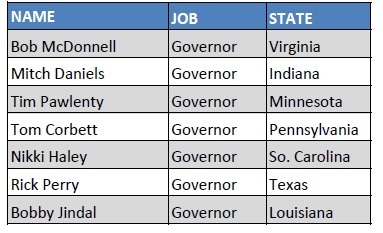Rick Santorum’s withdrawal from the Republican presidential nomination sweepstakes last week leaves Mitt Romney the presumptive choice to lead the GOP ticket in the fall. Romney had a strong probability of clinching the nomination in the primaries even with Santorum still in the race, but Santorum had the only chance left to stop him. Now that the party has settled on Romney, the new nominee has to choose his partner to the big dance – and that will have a big impact on whether the party will unite behind him in the general election.

Of course, thanks to a thoughtless comment by a Democratic strategist on CNN, the unity process was accelerated. Hilary Rosen, a Democratic consultant who has met with President Obama on at least five occasions at the White House during his term, attacked Ann Romney for not having insight into the struggles of American families since she didn’t have to work outside the home. That brought down a deluge of criticism from conservatives, many of whom had no real interest in defending Ann’s husband, and created the kind of wagon-circling Romney must have hoped would come by the Republican national convention.
That sense of camaraderie won’t last long, though, and Romney can’t put his wife on the ticket to keep it going. Romney will have the same challenges that every other nominee for President has: finding a running mate who will provide strength in his weak areas, and represent the nominee’s agenda while reaching out to other factions of his party – someone who can get the base excited enough to organize on behalf of the ticket without becoming a liability, and without overshadowing the nominee. That is no easy task, and other nominees have lived to regret their choice in partners, even some who managed to win the election anyway.
In order to help narrow down the choices, Romney appointed his former chief of staff in Massachusetts and longtime campaign adviser Beth Myers to lead the selection committee. That choice alone sends a couple of strong signals. First, Romney has put a woman in nominal charge of the most important decision he has to make in this campaign, which under the current “war on women” rhetoric from both sides is an unmistakable signal that Romney wants to address the gender-gap issues that tend to plague Republicans. It also shows that Romney will incorporate establishment figures like former Bush adviser and RNC chair Ed Gillespie into his campaign, but won’t allow them to control it.
Myers knows her boss better than most people in the GOP, and she will understand his personal requirements for the selection. The political realities are more straightforward. The question will be how Myers and Romney prioritize the criteria, along with the traditional considerations of regional balance and key-state issues. Romney himself gave an early hint this week by insisting that the running mate would have to be ready to take charge on Day One:
“I can tell you that the one quality that comes to mind immediately is that you want someone who, without question, could lead the country as president if that were necessary. I think all of the political considerations pale in comparison with the consideration of who has the capacity to lead America at a critical time. And I hope if I'm the president that eventuality would never occur. But that has to be the key consideration.”
Coming from a business executive with long experience in succession planning, as well as a former Governor, that clear statement would suggest that Romney wants someone with significant executive experience as a base prerequisite. That would exclude a couple of popular options. Senator Marco Rubio only joined the upper body fifteen months ago, and has already insisted a number of times that he won’t be on the ticket. Rep. Paul Ryan has been in Washington for over a decade, but again lacks the kind of executive experience that would make him ready to take over on Day One.
That might also eliminate Romney’s competitors in the nominating race, none of whom has formal executive experience, although Newt Gingrich did serve as Speaker of the House for four years. Santorum’s surprisingly efficient campaign could be enough to convince Romney to consider him, as well as his support from social conservatives and his draw among evangelical voters. However, Santorum’s reluctance to endorse Romney on the way out of the race may be too off-putting to Romney.
That makes governors, past and present, the strongest possibilities for a running-mate choice. Fortunately, that leaves plenty of options for Romney for either a regional/key state approach or ideological balancing. The key states in question this election cycle would be Florida, Ohio, and Virginia, all of which the GOP needs to win back from Democrats in order to beat Obama. The only other potential candidate for the job in Florida besides Rubio would be Jeb Bush, who passed on running for the top job, and whose last name might be a gift to Barack Obama in the election.
Ohio has two potential candidates, Governor John Kasich and Senator Rob Portman. Kasich, however, has struggled to maintain standing in the state after his union reform efforts flopped. Portman has had a diverse career in Congress and in the executive branch under Bush, and is popular with the fiscal conservatives in the Republican base, but might not have enough executive experience to meet Romney’s Day One credentials.

The best key-state candidate would probably be Virginia Governor Bob McDonnell, whose two-plus years as the top executive in the state comes after three years as Attorney General and another four years in the state legislature. McDonnell got significant grassroots backing in late 2009 as Virginia and New Jersey gubernatorial elections gave the Tea Party their first opportunity to go after Obama. McDonnell has a better chance of giving Romney a boost in Virginia than Kasich does in Ohio, and McDonnell gives Romney a regional boost as a Southern governor.
Speaking of regional balance, a traditional concern in running-mate selection, Romney would look to the South or Midwest for a Republican executive with a track record of success, since Romney himself would have his greatest strengths in the Northeast and mountain West. He has plenty of choices in these areas, but three in particular bear watching. Outgoing Indiana Governor Mitch Daniels endorsed Romney yesterday on Fox News and danced around the running-mate question; many fiscal conservatives in the party wanted him at the top of the ticket a year ago. His fight for the new right-to-work law in Indiana could make him even more attractive to Romney.
Tim Pawlenty served two tough terms in a liberal state fighting a Democratic legislature, much as Romney did but with arguably more success. And Pawlenty has been campaigning for Romney since dropping out over the summer. And while few are mentioning Pennsylvania’s Tom Corbett, he might be a surprise candidate. He took office a little over a year ago, but Corbett has served eight years in two separate terms as Attorney General. His fiscal reforms have not been popular, but he has also fought for exploration of natural gas in the Marcellus Shale Formation, a key jobs issue in Pennsylvania, a state Democrats can’t afford to lose. If Romney can’t bring himself to add Santorum, Corbett might be a more palatable alternative.
The South has at least three good prospects. South Carolina’s Nikki Haley endorsed Romney early, but she has only been in office for a little over a year after just four in the state legislature, and has had some political problems at home. Rick Perry hammered Romney during the debates, but Perry knows how to organize and engage the fiscal and social conservatives, although his earlier gaffes might undermine confidence in his value to the ticket. Bobby Jindal just won his second term as Governor in Louisiana, and could bring youth, experience, and a real success story of political reform to Romney’s banner.
If readers feel like they need a scorecard to keep all the players straight, that wealth of choices is good news for Romney and Myers – and even better news for the Republican Party. Not all of these are ready to be President, or even a heartbeat away from the presidency. They do make, however, a great bench for future campaigns, and a spot on the Romney ticket would give one of them a warm-up for 2016 or 2020.






